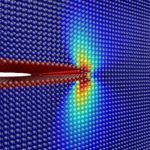Computational Engineering
 As technical developments become ever more complex and mathematically rooted, engineers are increasingly dependent on powerful hardware and software. As such, mastery of many computer science methods is required to successfully develop new products, compare technical solutions, or predict the impacts of design decisions.
As technical developments become ever more complex and mathematically rooted, engineers are increasingly dependent on powerful hardware and software. As such, mastery of many computer science methods is required to successfully develop new products, compare technical solutions, or predict the impacts of design decisions.
On the basis of these insights, Computational Engineering was developed as a combination of computer science, mathematics, and engineering as interdisciplinary equal subjects in one study programme. A globally recognized discipline, the subject area develops solutions to physical problems in science and technology through mathematical models and computer systems.
Computational Materials Science is a novel discipline that combines elements of materials science, physics, and chemistry with aspects of mechanical engineering, mathematics and computer science. Many macroscopic material properties are determined by phenomena occurring at the small length and time scales accessible by computational simulations. The Technical Application Field (TAF) CMS focuses on the theoretical and conceptual principles underpinning these phenomena as well as the understanding, independent implementation, and critical application of simulation software.
For in-depth information, visit the programme website.
Examination regulations and study guide:
CE examination regulations (as amended January 2016)
General Examination Regulations for the Bachelor’s and Master’s degree programmes at the Faculty of Engineering (as amended August 2015)